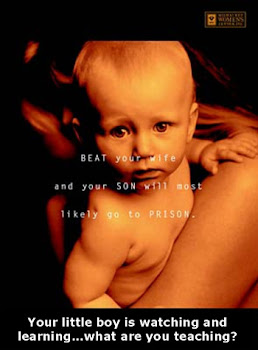June 15, 2010
By Judy Silverclose
The Chicago Tribune says that domestic violence calls to the Indianapolis police department are up 13% this year over last. The Honolulu Advertiser says that Hawaii’s Domestic Violence Action Center is fielding a third more calls this year than last. Rates are up in Arizona and Texas, too. The economy is down; stress and violence are up. A new Department of Justice study on Domestic Violence and Law Enforcement states that, while over the last decade the percentage of women who call the police after physical assault by an intimate partner seems to be rising from 30 to 60 percent, 40 percent of assaults still go unreported.
If police are called, either by the victim or by a third party (such as a neighbor or hospital) the study says: Researchers found 29% of victims reported “no assault.” Ironically, their alleged assailants were more likely to admit the assaults, with only 19% reporting “no assault”. Law enforcement officers may find that the most severely traumatized victims, behave least, as law enforcement officers expect of them. They may also be the least able to cooperate with law enforcement. Addressing the question of whether arrest is the best response to intimate-partner violence, the report says: Arrest deters repeat abuse, however, all actions taken by responding officers , including providing victims with information pamphlets, taking down witness statements, and helping victims secure protective orders were associated with reduced cases of reoffending abuse.
If an arrest is made, the percentage of cases prosecuted varies wildly, from 46% in Milwaukee to 94% in Cincinnatti, with the average being about 60%. Sometimes police arrest an abuser for a lesser charge (disorderly conduct) instead instead of assault. However, the report warns, reducing charges to non-assault charges allows convicted abusers to retain firearms otherwise prohibited. One of the most crucial steps to prevent lethal violence is to disarm abusers and keep them disarmed. A commenter on our site, Sheri Ferber, a former member of Rick Warren’s, Saddleback church, was also a victim of Domestic Violence.The story is heartbreaking. Four years ago, [Ferber] approached a Saddleback pastor for protection against her husband, who’d violently attacked her while they were driving home from church. Instead of protecting her, Ferber says, the pastor called her husband to warn him that Ferber had been “gossiping about their marriage.” Ferber, it seems, had run into Saddleback’s teaching that the sanctity of marriage prohibits divorce in all but a few circumstances, and domestic violence is not one of them. Author Kathryn Joyce goes on to explain: Jocelyn Andersen, was severely battered by her assistant pastor husband. She argues that submission teachings don’t create abusers, but allow violent men to justify their abuse as biblical. The real danger, though, is in how the teachings impact devout women, who may conclude they can’t leave their marriages and remain committed Christians. Fortunately, there is evidence of people fighting for change, even in very conservative churches. In fact, the same author, Kathryn Joyce, also wrote on the Saddleback domestic violence issue for Religion Dispatches, where she quotes conservative Christian author Barbara Roberts: “I think Saddleback’s teaching is profoundly and dangerously wrong,” says Roberts, offering them her book’s findings that ,1 Corinthians 7:15-a verse commonly interpreted as applying solely to an unbeliever: Deserting a believing spouse-provides the biblical grounds for abused wives to consider their union nullified. “The key question is not ‘who walked out’ but ‘who caused the separation?’ Of course, many churches already teach that violence abrogates the marital covenant and refer congregants to abuse specialists. And Christians don’t have a monopoly on the issue. Jewish, Muslim and interfaith women also suffer Domestic Violence. Thankfully, for victims who don’t feel comfortable calling the police, there are trained specialists available. The National Domestic Violence Hotline, provides crisis intervention, information, and referrals to shelters and programs. Calls are free, confidential, and anonymous. The Number Is 1-800-799-7233.
The New Agenda welcomes readers who have a background in this area, If you are interested in writing about it, in more detail. Contact us at: blog@thenewagenda.net.
As “Lived It” said, may God have mercy on us all.
Thursday, June 17, 2010
Subscribe to:
Post Comments (Atom)
Children Learn What They Live






No comments:
Post a Comment